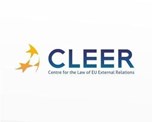[CLEER presidency lecture] The German presidency of the Council of the European Union
24 February 2021- Starts at: 16:00h
- Fee: Free
- Venue: Online
- Organiser: T.M.C. Asser Instituut
- Register
On 24 February at 16.00-17.30 hours CET, the German ambassador to the Netherlands, H.E. Mr Dirk Brengelmann, will speak on Germany's experience during its presidency in a new edition of the Centre for the Law of EU External Relations (CLEER) presidency lecture series. To attend this free lecture, please register here.
Germany held the presidency of the Council of the European Union between July 2020 and December 2020. The rotating presidency of the Council of the EU offers coordinating and representation opportunities for the member state holding it, as well as the opportunity to emphasise political issues of relevance to the EU.
In preparation for its presidency, Germany set several priorities and goals to be achieved by January 2021 under the slogan ‘Together for Europe's Recovery.’ Its guiding principles were:
- Overcoming the COVID-19 pandemic permanently, as well as the economic recovery
- Promoting a stronger and more innovative Europe in the wake of COVID-19
- Advancing fairness, social cohesion and solidarity in Europe
- Supporting sustainability within the EU
- Strengthening EU values and security
- Supporting the EU's role in the world
Achievements
One of the highlights during the German Council Presidency was the enabling of the compromise on the Multiannual Financial Framework and the Recovery Fund, despite concerns relating to the rule of law raised by a few member states. Other achievements include the compromise on a further reduction of CO2-emissions by the EU by 2030, the political agreement on a EU-CHN Investment Treaty, and the Trade and Cooperation Agreement with Great Britain.
The German Presidency further focused on the regulation of mobility during the COVID-19 pandemic. This effort included the unanimous adoption of Council conclusions on benchmarks for a pandemic and crisis contingency plan for the freight transport sector. Another Council conclusion dealt with compliance with hygiene and infection control measures to ensure cross-border collective passenger transport in July 2020.
The speaker
H.E. Mr Dirk Brengelmann has been the Ambassador of the Federal Republic of Germany to the Kingdom of the Netherlands since August 2016. Prior to this, he was the Deputy Permanent Representative on the North Atlantic Council, Brussels from 2008 to 2010; the NATO-Assistant Secretary General for Political Affairs and Security Policy from 2010 to 2013, the Commissioner for International Cyber Policy, Foreign Office, from 2013 to 2014, and the German ambassador to Brazil from 2014 to 2016. Mr Brengelmann holds degrees in Economics, Business Administration and History from the Heidelberg and Hamburg Universities.
The respondent speaker
Dr Joris Larik is assistant professor of Comparative, EU and International Law at the University of Leiden and a member of the advisory board of CLEER. Dr Larik has published extensively in the field of EU external relations law.
The event will be moderated by Dr Eva Kassoti, senior researcher in EU and international law at the Asser Institute and academic co-ordinator of CLEER.
Register here.
About CLEER
Since 2011, the Centre for the Law of the EU External Relations (CLEER) and T.M.C Asser Instituut have been organising a dedicated lecture series with a a focus on a peculiar element of EU external relations: the role of the incumbent presidencies in coordination and leadership in regional and global issues.
The CLEER Presidency lecture series looks at the presidency terms in retrospect, in order to assess how the member state fulfilled these aspirations and what its actions mean for the European Union’s international relations. Click here to learn more about the CLEER Presidency lecture series.


